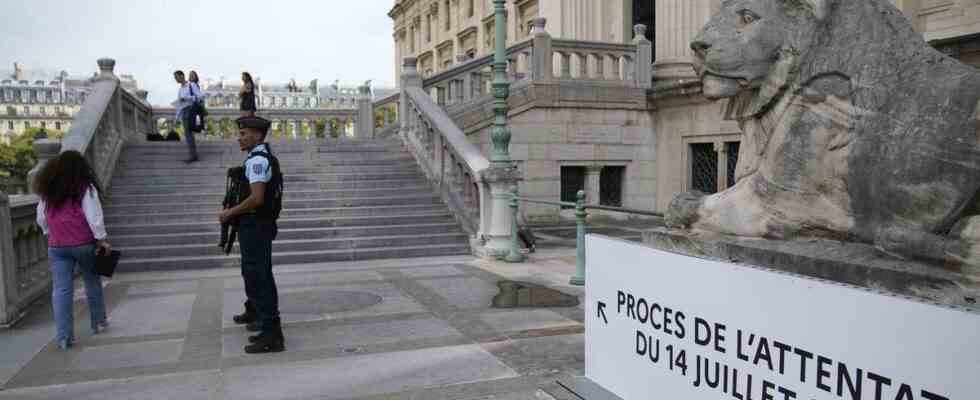She is the youngest to come before the special assize court in Paris to tell the day she almost died. Myrtille, 15 today, is not the youngest victim of the Nice ram truck attack, but few minors, among the hundreds who suffered or are suffering from trauma related to the attack, had the opportunity to testify in court. On the evening of July 14, fifteen of the 86 people killed were under 18 years old.
“I have this image, still regularly, of me in the face of death, unable to do anything more”, says with a voice that has remained infantile Myrtille, hair partially dyed blond, peacoat and black pants, Thursday. She stands tall in front of the court. On the desk, she placed a few perforated copies, like those students use in high school, where she threw handwritten notes taking care, as for an assignment, to highlight certain passages. She tries to speak clearly but can’t resist massaging her hands to release her stress.
“I heard screams then I saw the truck”
Myrtille was only nine years old on the evening of July 14, 2016. “That evening we decided to go rollerblading (with her father) on the Promenade des Anglais as we often did in summer,” she says. “I remember talking about the pleasant weather and saying that I wish every night was like this,” she continues with a sad smile.
After seeing the fireworks, Myrtille and her father are returning to their home when suddenly “we saw people running towards us”. Behind these panicked people there is the 19-ton truck of the Tunisian Mohamed Lahouaiej-Bouhlel launched at full speed on the crowd gathered on the Promenade. “I heard screams and then I saw the truck,” said the teenager. The little girl then is literally paralyzed.
“I didn’t understand what was going on. I thought it was an accident. That the driver had lost control” of his vehicle, she explains. “At that time, I was afraid for him”. The truck is approaching. “I saw people jumping” over a railing to go to the beach “but with my rollerblades I couldn’t do it”. Myrtille is overwhelmed by the impression that “nothing is possible anymore”.
The truck zigzags choosing where there are the most people. Her father pushes her to the right. They both fall on the road and the truck brushes them. “I saw the wheels of the truck in front of me and even if it only lasted a few seconds I sometimes feel like I’m reliving a scene that lasts an eternity”, says the young girl.
“It chills my blood”
When she comes to her senses, her father Kevin, also present at the helm, urges her not to look around. In vain. “People were screaming, shouting, it was chaos,” recalls Myrtille. Kevin calls his girlfriend. Myrtille calls her mother. “When she picked up, she was crying,” says the teenager who, hearing her mother’s cries, realizes the tragedy that has just unfolded.
From this moment it is the black hole. “I don’t remember the next day, or the days, or even the months that followed” the attack. What she remembers today are “sleepless nights, crying for no apparent reason, loneliness, panic attacks at the slightest unforeseen”. With a slightly cracked voice, she recounts those little everyday things that always startle her; the cars driving too fast, the fireworks – she never saw any again – the sound of firecrackers, even a sudden “snap of the fingers”. “It chills my blood,” she said.
Myrtille speaks of “a weight that weighs on his shoulders”. “Nothing and no one can change the events of that evening” but “perhaps the trial will make it possible to envisage a better future”. “It doesn’t matter whether this future is complicated, beautiful or tumultuous”, continues Myrtille who dreams of no longer remaining “chained to this past”.

